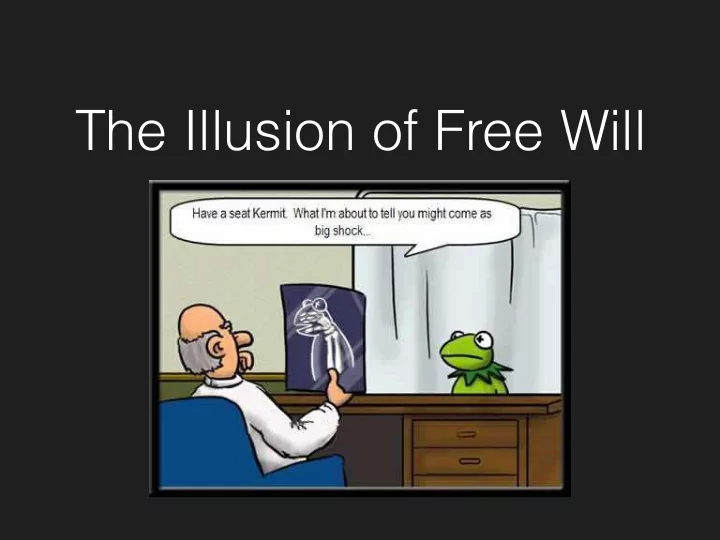

The Illusion of Free Will
“Let us then understand free will as the capacity unique to persons that allows them to control their actions.” - Internet Encyclopedia of Philosophy “A belief that there is a component to biological behaviour that is something more than the unavoidable consequences of the genetic and environmental history of the individual and the possible stochastic laws of nature” - Anthony Cashmore
• Genes • Parents • Childhood • Environment • Hormones • Perhaps quantum indeterminacy
Evidence? • Experimental • Subjective
• Benjamin Libet’s finger wiggle experiment • Patients were monitored with EEG electrodes and asked to wiggle a finger whenever they like while looking at a clock • The patient was asked to record the time they consciously decided to move their finger • The researchers wanted to know if the conscious decision to move their finger corresponded with the beginning of the EEG signal
“As of 2008, the upcoming outcome of a decision could be found in study of the brain activity in the prefrontal and parietal cortex up to 7 seconds before the subject was aware of their decision.” - https://en.wikipedia.org/wiki/Benjamin_Libet
• Warm cup + cooperation • Oxytocin + trust • Hormones + behaviour • Facebook newsfeed + emotional contagion • People are hardly if ever aware of what makes them choose what they choose. But they always have a story to explain their choices
Experimental → Subjective evidence evidence
“Intrusive Thoughts”
• ADHD • Anorexia • OCD • Bulimia • PTSD • Maladaptive Daydreaming • Depression • Factitious disorder • Bipolar • Jerusalem syndrome • Addiction • And more… • Schizophrenia
Inability to focus • Tip of the tongue • Song in head • Don’t think about a … •
Choose a city
Could you have chosen a city which did not occur to you to choose?
Did you do the “occuring”?
Misconceptions • Fatalism vs Determinism • Do choices matter? YES • Is change possible? YES
Why don’t we get mad at people with mental disorders?
• We don’t have bodies, we are bodies, and we are not exempt from the laws of physics and causality • We’re all free to act how we want to act, but where do our wants come from? • Lab experiments show brain activity precedes feeling of making a choice • You can notice this in yourself
• You can’t control your thoughts, positive or negative • But you can train your thoughts, through CBT, education, meditation, etc • We assign blame when we feel people could have done otherwise • Ultimately, we are all a product of genes, environment, childhood, random events and a multitude of other factors outside our control
“I do not believe in free will. Schopenhauer's words: 'Man can do what he wants, but he cannot will what he wills,' accompany me in all situations throughout my life and reconcile me with the actions of others, even if they are rather painful to me. This awareness of the lack of free will keeps me from taking myself and my fellow men too seriously as acting and deciding individuals, and from losing my temper.” - Albert Einstein, My Credo (II) http://www.einstein-website.de/z_biography/ credo.html
Recommend
More recommend